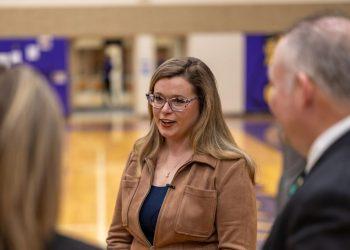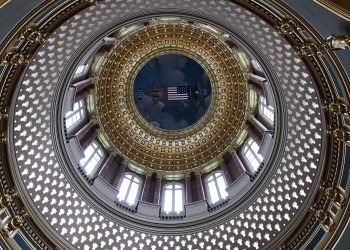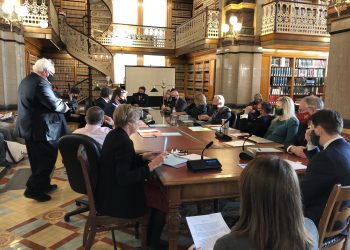DES MOINES, Iowa – On Thursday evening during debate on SF 159, Gov. Kim Reynolds’ “Student First Act,” which offers several school choice provisions, State Senator Claire Celsi, D-West Des Moines, called the bill racist.
Her comments came during opening remarks for an amendment that she filed that would remove the provision in the bill eliminating voluntary diversity plans as a reason for denying a student open enrollment. Instead, the amendment to the bill would create a commission to study the issue.
School districts with voluntary diversity plans under Iowa law can deny open enrollment requests for families that do not qualify for free or reduced school lunches. Currently, a family of four whose household income exceeds $49,025 would not be eligible.
Des Moines, Davenport, Postville, Waterloo, and West Liberty are the only five school districts in Iowa that use voluntary diversity plans.
Removing this potential hurdle was a priority Gov. Kim Reynolds shared in her Condition of the State address.
“Last summer, when we had that great moment of unity and voted for a racial diversity, racial equity, racial justice bill. Everyone really, I believe, everyone wanted to keep the conversation going, as Republicans say all the time, keep the conversation going, and really talk about ways that we can help Iowans in poverty,” Celsi said.
“This is about preserving the integrity of neighborhoods. When a voluntary diversity plan is crafted with the district, and sometimes the city participating, it helps the district balance the needs of the students and the overall student population,” she added.
Celsi inferred that eliminating the voluntary diversity plan would concentrate poverty, increasing segregation.
“I heard a colleague of mine say it’s not a racist bill. I don’t know. Maybe it is. I think it’s pretty racist myself,” she stated, seemingly directing her comment to State Senator Amy Sinclair, R-Allerton, who floor managed the bill.
State Senator Zach Whiting, R-Spirit Lake, raised a point of order, and he said that Celsi needed to direct her comments to Senate President Jake Chapman, R-Adel, who then reminded the body they needed to do that in their remarks.
Celsi pointed out that suburban districts in the Des Moines Metro were already “bursting at the seams.”
She continued, “It would increase the property tax burden on residents and businesses and hurt the attractiveness of the region and discourage businesses from locating here. In fact, let’s talk about businesses. Businesses are looking for places to locate that value diversity. This is a step in the wrong direction.”
Sinclair rose in opposition to Celsi’s amendment.
“I’ve been called racist enough lately. So I’m going to step up and call some things out here. Three of these voluntary diversity plans are based solely on socio-economic standards. In fact, the desegregation plans, the reason voluntary diversity plans exist, are because these desegregation plans were struck down by the Supreme Court. These are not racist comments. These are not racist provisions. They are not racist bills,” she stated.
“I spoke earlier of the scholarships that are available to students and failing schools, and there are 34 comprehensive buildings in the state, 34 schools that have failed the children in them. Thirty-four schools that have gotten so bad that they need federal assistance to try and improve. Twelve of those 34 school districts are protected by these voluntary diversity plans, Mr. President. Twelve of these buildings that are on this list of 34 where children are not being taught are protected by these voluntary diversity plans,” Sinclair argued.
“We don’t have time to study it. These children are not being educated. Those 12 district school buildings that are under these districts that have voluntary diversity plans are based on socio-economic standards alone. The average free and reduced lunch eligibility of the children in these districts is over 72 percent. We’re trapping poor minority children in failing buildings, and to push this off another year so we can study it is a travesty to the children who need our help,” she concluded.















